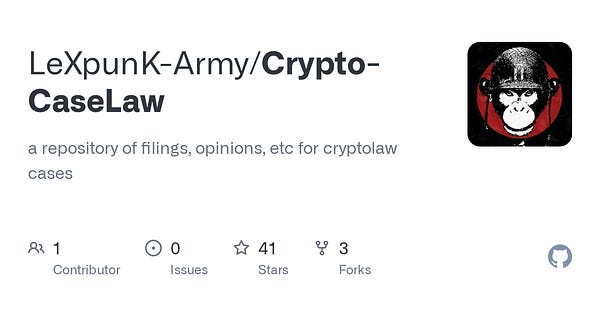EU DeFi report, Singapore proposes stablecoin + payment token rules; only 0.5% Nigerians use eNaira, UK Parliament on crypto as regulated financial instruments; EU stablecoin cap "not rocket science"
CryptoLaw's Newsletter #67
Hello everyone,
Several EU crypto-legal updates this week, as well as news from Singapore, Japan, Korea, the UK, Nigeria, Botswana and elsewhere:
Top-5:
EU’s latest DeFi report: voluntary compliance and oracle rules;
Singapore proposes stablecoin and payment token rules;
Only 0.5% of Nigerians use eNaira;
UK House of Commons votes on cryptoassets as regulated financial instruments under the proposed Financial Services Markets Bill;
EU’s stablecoin issuance cap not “rocket science”; Parliament prepares NFT resolution.
And also…
The EU’s latest on DeFi, stablecoin cap and NFTs:
DeFi was carved out of the EU’s Markets in Crypto Assets (MiCA) Regulation, but the plan isn’t to leave it (entirely) unregulated. The European Commission published a DeFi report prepared by prof. Roukny. He focused on the difference between CeFi and DeFi in terms of information structure. Information frictions have been the "raison d'être" of financial intermediaries, he argued. The main value proposition offered by DeFi is a shift in the information structure upon which financial services can be deployed, in his view. His recommendations for DeFi supervision: focus on entities already regulated under financial market rules that engage with DeFi, incentivise a voluntary compliance regime for decentralized projects, set up a DeFi observatory and scrutinize oracles (bringing off-chain information on-chain).
The EU may have “overregulated” stablecoins in its MiCA Regulation, according to one MEP. A French official added that the controversial issuance cap on some stablecoins isn’t rocket science and could be revised – up or down.
NFTs (at least most of them) were excluded from the EU’s MiCA Regulation. Will the EU propose an NFT-specific rulebook? The EU Parliament is working on an NFT resolution and may ask for NFT-bespoke rules.
Singapore is preparing an updated crypto rulebook. For stablecoins, the Monetary Authority of Singapore (MAS) wants a bespoke set of rules, focusing on single currency-pegged stablecoins issued in Singapore, whose circulation exceeds S$5 million. One of the restrictions MAS proposes for such stablecoin issuers is that they hold reserve assets “that are at least equivalent to 100% of the par value of the outstanding SCS in circulation, and these assets must be denominated in the same currency as the pegged currency”. These stablecoins can only be pegged to the Singapore dollar or 10 other selected fiat currencies. For digital payment assets, MAS wants to prohibit “the use of credit facilities and leverage by retail consumers for cryptocurrency trading”. The consultation period on both crypto proposals ends on 21st December.
In the UK parliament, the House of Commons voted to include cryptoassets as regulated financial instruments under the proposed Financial Services Markets Bill, which would clarify that “the powers relating to financial promotion and regulated activities can be relied on to regulate cryptoassets and activities relating to cryptoassets”.
Law firm K&L Gates tackles 3 mistakes to avoid in NFT licensing. The second, “perhaps the most pervasive licensing failure, is that some NFT ventures provide explicit license language in connection with their NFTs but fail to put NFT purchasers on notice of the existence or terms of the license. Without clear notice of terms, the license is likely to be ineffective and unenforceable.”
Only 2 out of 5 crypto industry witnesses showed up for a parliamentary hearing in South Korea in the aftermath of the Luna/Terra crash. Lawmakers were not amused.
Nigeria’s eNaira hasn’t really taken off yet: less than 0.5% of the population is using the digital currency. The country’s central bank is turning to three-wheeler taxis to boost adoption.
A leaked draft of the US Digital Commodities Protection Act (DCPA) ruffled feathers on crypto twitter.


Many DeFi proponents fear the DCPA will significantly curtail DeFi. FTX’s Sam Bankman-Fried didn’t share these concerns. He proposed crypto industry standards “to create clarity and protect customers”. For DeFi front-ends, he proposed “some license/registration/etc.”, for example for a US hosting a website on AWS “that actively provides a front-end that encourages and facilitates US retail users to trade on decentralized protocols”. DeFi proponents weren’t too thrilled. Read more in the latest edition of Around the Blockchain.
US senators Elizabeth Warren and AOC take aim at crypto’s revolving door.
Australia’s Securities and Investments Commission took legal action against people behind Qoin, alleging false and misleading claims about the coin.
A pan-African crypto exchange obtained a VASP license in Botswana, claiming to be the first crypto company obtaining a VASP license in Africa.
Crypto whales will be closely monitored by South Korea’s Financial Services Commission for AML compliance.
Japan is losing its pole position in gaming due to its crypto approach.
The EU’s MiCA and Transfer of Funds Regulation: next steps explained by Chainalysis.
Cryptoassets and sanctions compliance – a primer by GDF.
Thanks for reading!




